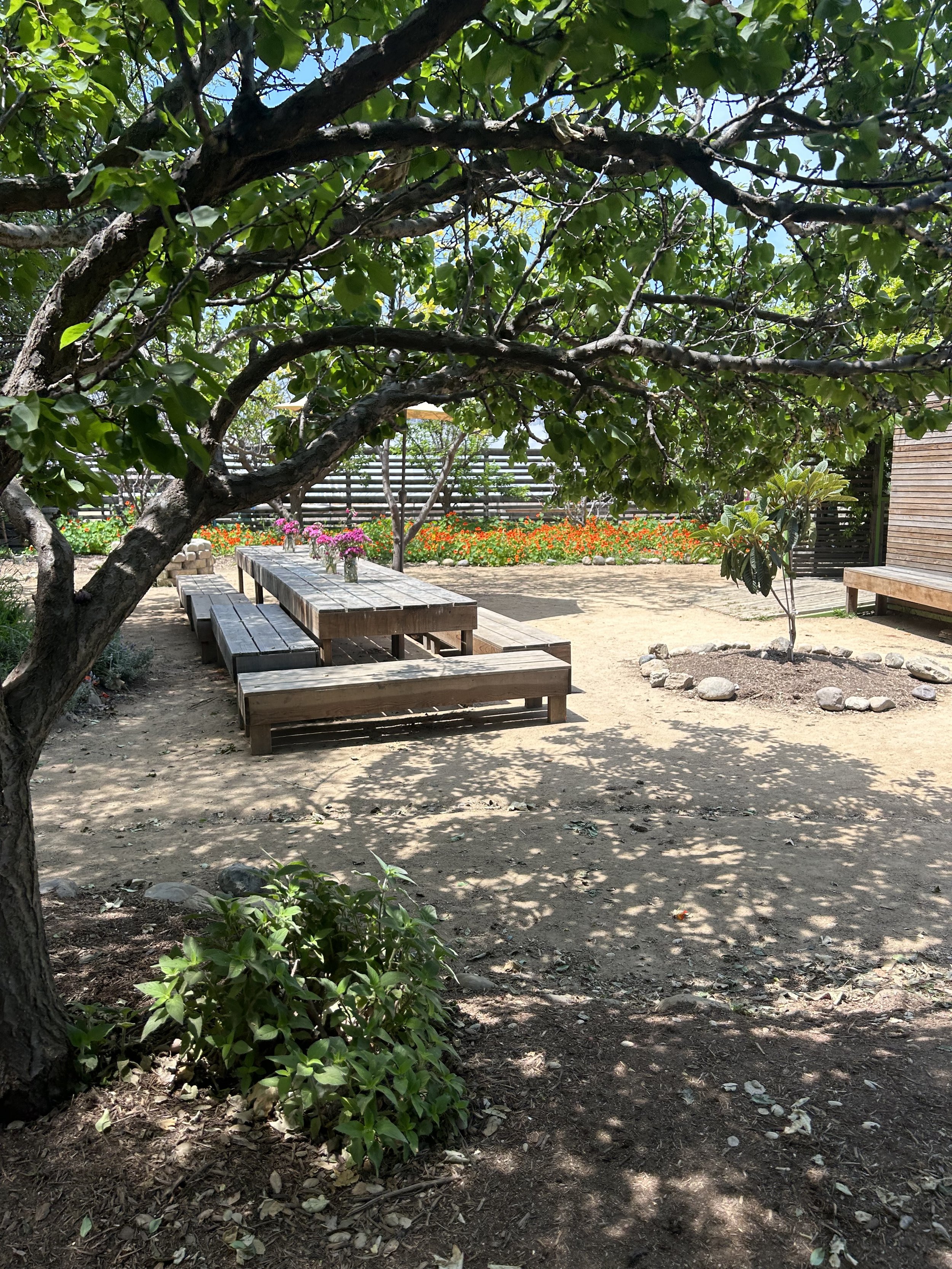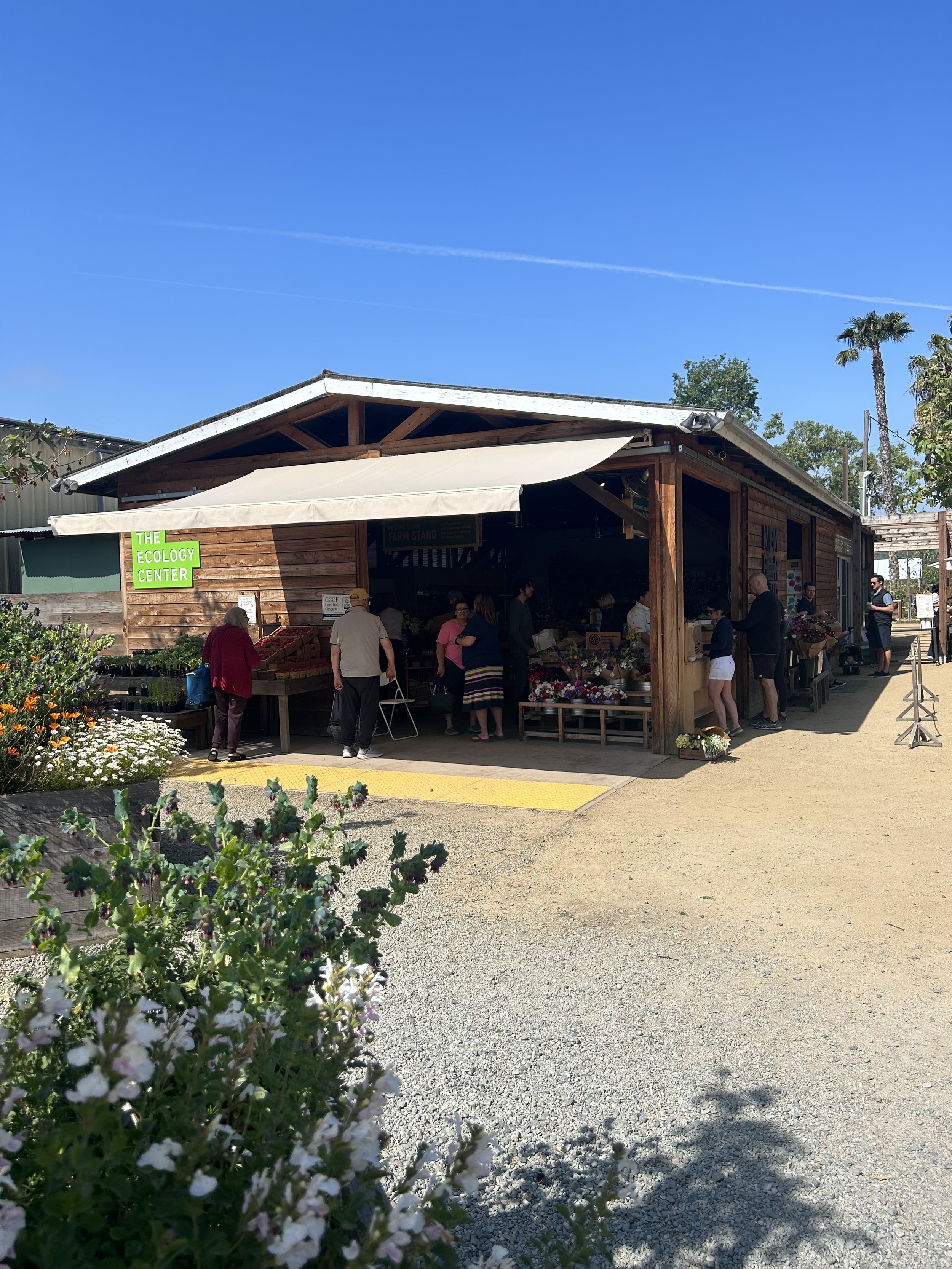Organic Origins: The Ecology Center
OUR EXPERIENCE
The Ecology Center is a regenerative organic farm on twenty-eight acres of historical land in San Juan Capistrano, Southern California. This center, with a mission of creating solutions for thriving on planet Earth, practices sustainable agriculture with an all-organic accessible farm stand and education center. As a 501C3 non-profit organization, The Ecology Center protects waterways, the health of wildlife, and attempts to bring back the essential relationships between growers and eaters. The Ecology Center is "modeling a radical regenerative methodology of agriculture through the farm, bringing sustainability back into communities like it was in the last thousands of years. It is essential that people have a relationship with the growth of the food they consume," says the director of engagement Jonathan Zaidman. Many volunteers enjoy their experience here, attending events such as the Strawberry UPick festival, arranging flower bouquets, and educating children in the Eco-tots garden to help establish a deeper connection between young humans and nature.
With over one hundred thousand pounds of food donated and three hundred thousand onsight visitors, The Ecology Center's staff welcomes everyone aged fifteen and up to volunteer and be a part of their mission of building a regenerative, pro-farmer, environmentally healthy community.
Last weekend, The Giver’s Guide toured different areas of the farm. Walking in, we first caught sight of the farmstand market. Farmstand shoppers have an option of a monthly harvest box which retails for fifty-five dollars. Shopping at the farm stand supports farmer rights, helping farmers receive livable wages, year-round work, and health benefits. The Ecology Center also takes part in the EBT program and matches EBT purchases one-to-one. We continued touring the farm and passing by the flower stand; we were pleasantly surprised with the smell of roasted chai spices coming from the Campesino Cafe.
Around eleven am, hundreds of people began arriving for the Strawberry U-pick festival, which takes place during strawberry season in April. Due to the sudden crowd, we headed to the parking lot to assist in directing drivers. The head of the Department of Education Gregory Foster kindly greeted us as we relocated to the Eco Tots center, where we were introduced to another volunteer who interacted with children ages one to five, painting pictures, planting seeds, and building fairy houses. We met customers from multiple ethnic backgrounds coming together with their families all in support of The Ecology Center's cause. Later in the day, we assisted the organizers of the Strawberry picking festival by making hands-on simulations of seed planting with children and bagging strawberries for families. We were also offered to take home a bag of strawberries, and in the process learned how each type had different flavors and aromas.
After a fulfilling visit and volunteer experience at each section, it is easy to see that the Ecology Center works hard to cultivate a sense of community in Orange County and fully executes their mission with pride. We recommend this experience for people interested in nature opportunities, more specifically, sustainable agriculture and fighting the issue of food insecurity. The Ecology Center is a must visit, whether for volunteer opportunities, a fun day immersed in nature, or even to simply enjoy a snack, offering an unforgettable experience.
THE MISSION
Every nonprofit has a driving force that motivates their selfless work and acts as the organization's foundation. The Ecology Center has two main principles: modeling a profitable, radical, and regenerative agriculture methodology through the farm, and mentoring the next generation using educational experiences involving nature.
Their stated mission is "creating solutions for thriving on planet Earth." With this mantra, the center works towards cultivating a more earth-friendly way of growing and distributing food by setting an example of a regenerative and sustainable farm. In our interview with Jonathan Zaidman, he explained how, about 75 years ago, we began to industrialize agriculture, incorporating the use of chemicals and machinery in producing food that humans and animals had otherwise done. Though this allowed farmers to produce more products, their execution was detrimental to the environment and caused many of the problems we now face regarding production. Jonathan listed the effects saying it "poisoned our planet, our health, our wildlife, and our waterways," adding that "conventional and industrial agriculture is also a top contributor to climate change." Good intentions turned to disastrous effects as this attempt at improving our agricultural processes led to extreme consequences for the planet and its inhabitants. With this background knowledge, the center is about getting back to healthy, ethical, and viable food production methods.
The second aspect of the ecology center's foundation is education for younger generations. Classrooms today should emphasize connections to the Earth and nature as global warming is becoming more of a threat. The Ecology Center provides a space for children to explore and form a connection with the planet by learning about agriculture and nature using hands-on activities. By educating young minds about the environment, the center ensures continued care for the planet for future generations and instills a love of the Earth in all its visitors. Even parents whose views do not align with those of the center would have trouble denying that allowing children to play in nature is a negative thing. Not only does the ecology center want to protect the planet's future and agriculture, but they also emphasize the positive effects that connecting with the planet has on children and adults. With social media and technology available to young children, an appreciation of agriculture and nature is increasingly becoming more important. According to a study published by the National Library of Medicine that focused on the impacts of contact with nature on human health, "92% [of patients] demonstrated consistent improvements across any health outcome where individuals engaged with natural outdoor environments." The positive impacts of interactions with nature on mental and physical health are undeniable and continue to be a driving factor for the ecology center's focus on education.
The ecology center and their mission have created an example of a regenerative farm as a solution to the issues they exist to solve. It is clear to any visitor that they are a passionate, motivated, and successful nonprofit that is truly an exceptional place to volunteer. Check out our volunteering page for more information and ways to get involved!



